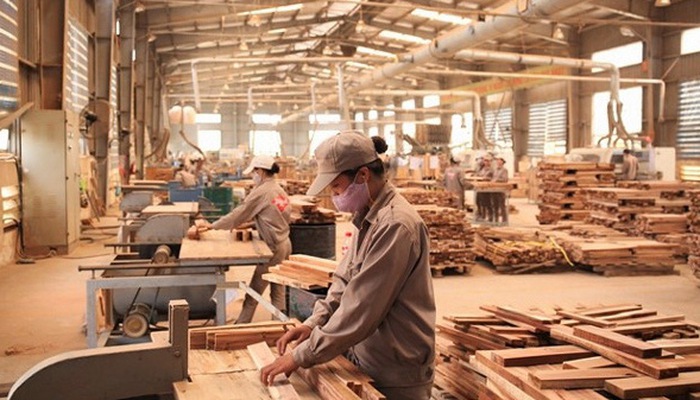In the first 7 months of 2020, Vietnam’s wood exports to the U.S. reached USD 3.23 billion, up 25% over the same period.
According to U.S. data, furniture codes alone have code 41000, each year the United States imports from countries to 36-39 billion USD. According to statistics from UNCOMTRADE, in 2018, china’s export turnover of 228 timber products to the US was USD 20.7 billion; from Vietnam to the U.S. nearly $ 5 billion.
According to Forest trends, to date, a total of 228 Chinese timber and wood products exported to the U.S. are subject to a new tariff of 28%. In addition to being subject to new tariffs imposed by the trade war, many Chinese furniture items have also been subject to very high anti-dumping (AD) and anti-subsidy (CVD) tariffs imposed by the US Government.
Specifically, Chinese kitchen cabinets exported to the U.S. are subject to 4 levels from anti-dumping duties from 4.37% to 262.18% from February 28, 2020. Chinese sofas exported to the U.S. were imposed with anti-dumping duties of 2 levels from 4.27% to 70.71% since December 20, 2004. Chinese hardwood plywood products are being imposed by the U.S. AD/CVD since January 4, 2018 with an anti-dumping duty (AD) of 183.36% and an anti-subsidy tax (CVD) of 194.9%.
On April 13, 2020, the United States officially decided to apply anti-dumping duties on Chinese kitchen cabinets exported to the country with a tariff of up to 48.5%, even some items and raw materials are subject to tariffs up to 293.45%.
Due to the new tariffs, export turnover in 2019 decreased by 23% compared to export turnover in 2018. According to Forest Trends calculations based on data from China Customs, sofa exports (HS 940171) from China to the U.S. plummeted, from nearly $1.9 billion in 2018 to nearly $1.36 billion in 2019, equivalent to a 28% decrease. Kitchen cabinets (HS 940340) are an important group of goods exported to the U.S. by China. The value of imports of these goods to the U.S. fell sharply, from $13.7 billion in 2018 to less than $9.7 billion in 2019.
In 2019, vietnam’s export turnover of wood products to the US reached nearly 5.13 billion USD. Turnover from this market accounts for about 54% of the total export turnover of Vietnam’s wood products to all markets.
In the first 7 months of 2020, Vietnam’s timber exports to the US reached USD 3.23 billion, an increase of 25% over the same period in 2019. The growth motivation for exporting wood and wood products to the U.S. market mainly comes from the group of furniture and exterior. In particular, items with very high growth are: kitchen furniture (code 940340) increased by 156%, other wooden furniture (code 9403.60) increased by 25% and furniture department (code 9403.90) increased by 34%.
Seating items are the group with the highest export value to the U.S. market. Each year about 380 businesses are directly involved in the export of sofas to the US, including complete sofa products (code 940161) and parts of sofas (code 940190). The number of businesses exporting sofas to the U.S. continues to increase: in 2019 there were 378 enterprises, statistics in the 7 months of 2020 were 388 enterprises.
Kitchen cabinets (code 94034000) are one of the important items exported to the US from Vietnam. Kitchen cabinets exported from Vietnam are also in the form of parts, declared in other codes such as construction furniture (code 4418), other wooden furniture (code 940360) or furniture department (code 940360).
In the first 7 months of 2020, the export turnover of kitchen cabinets from Vietnam to the US reached USD 235.9 million, up 156% over the same period of 2019, accounting for 74% of the total export turnover of this product in the same period for all markets. On average, more than 200 enterprises export kitchen cabinets to the U.S. each year. The number of enterprises directly participating in the export of kitchen cabinets continues to increase: in 2019 is 201 enterprise, in 7 months of 2020 is 207 enterprises.
BEWARE OF RISKS
However, the risk to furniture, especially those made from plywood exported from Vietnam to the U.S. market has become a reality, which is a trade fraud lawsuit. On June 9, 2020, the United States announced an official investigation into the Vietnamese plywood industry.
According to the U.S. Fair Trade Alliance allegations, some companies that export plywood from Vietnam to the U.S. market, mostly chinese-owned companies, violated anti-tax evasion laws under the U.S. Tax Act of 1930.
According to Forest trends, not all Chinese enterprises with manufacturing and business activities in Vietnam engaged in exporting kitchen cabinets and sofas to the U.S. have commercial acts. However, kitchen cabinets, sofas and parts of these items are hiding signals about commercial risks, especially in the stage of origin. The export value of these goods from China to the U.S. has plummeted since the U.S.-China trade war began, mainly because of new tariffs imposed by the U.S. Government on these goods from China.
Case studies of Chinese companies engaged in the production of kitchen cabinets and sofas show that most domestic manufacturing activities (Vietnam) are very limited. Companies engaged in the production and import and export activities of this product focus on only 1 single product or parts of this product without diversifying the output of the product.
If, as of now, the conclusion of the U.S. investigation is similar to the original allegation, businesses exporting Vietnamese plywood products to the United States will suffer enormous consequences for the tariffs. The lesson from U.S. lawsuits against timber items from China is the best evidence.
In the risk of plywood trade, the Government has recently introduced a number of important mechanisms and policies. Specifically, Decision 824 in 2019 of the Prime Minister to approve the project “Strengthening state management of anti-evasion measures and origin fraud” requires authorities to strengthen inspection and management of potentially risky items, including plywood imported from China into Vietnam.
RISK CONTROL SOLUTIONS
The important issue is how to control these risks? The report of Forest trends and Vifores has recommended to the authorities of Vietnam a number of mechanisms, policies and measures. First of all, from the source of export and import statistics data, customs authorities in coordination with information from enterprises and association will identify products with signs of risk. The source of import and export statistics from the customs authorities allows to identify the unusual increase in the export of these goods from Vietnam to the US, and in the import of this goods, or parts of this product from China to Vietnam.
It is recommended that the Timber and Forest Products Association build an information collection network through local businesses and associations. Enterprises in the industry directly involved in the production and trading of items showing signs of fraud by Chinese companies (or Vietnamese companies employed for Chinese companies) are the most important source of information, helping the management agencies to be able to handle fraudulent acts.
Vifores and local woodworking associations need to build links with Serious Chinese companies in Vietnam, exploiting and receiving information from this affiliate network in order to locate companies that commit fraud. Trade fraud not only affects Vietnamese businesses but also directly affects Chinese companies doing serious business in Vietnam. Propose the regulatory body to establish an action group, with the participation of stakeholders, to detect and solve the problem quickly and efficiently.
The complexity of commercial fraud acts requires timely and effective processing beyond the scope of the customs authorities. This requires the participation of other stakeholders, including industry, taxation, finance. In addition, the management agencies need to strengthen resources, closely monitor the stage of certification of origin of exported products.



 Tiếng Việt
Tiếng Việt 日本語
日本語
